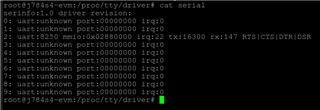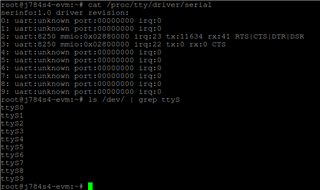Other Parts Discussed in Thread: TDA4VH, SYSCONFIG
1、How to bind uart4 to /dev/ttyS6?
I have add below code in k3-j721e-common-proc-board.dts to test uart4 in A72. I thought uart4 should use '/dev/ttyS6', but as I test '/dev/ttyS0' bind to uart4.
main_uart4_pins_default: main-uart4-pins-default {
pinctrl-single,pins = <
J721E_IOPAD(0x190, PIN_INPUT, 1) /* (W23) RGMII6_TD3.UART4_RXD */
J721E_IOPAD(0x194, PIN_OUTPUT, 1) /* (W28) RGMII6_TD2.UART4_TXD */
>;
};
&main_uart4 {
status = "okay";
pinctrl-names = "default";
pinctrl-0 = <&main_uart4_pins_default>;
/* Shared with ATF on this platform */
power-domains = <&k3_pds 281 TI_SCI_PD_SHARED>;
};
2、How to add the GPIO' pinmux in A72? I can not find a place to add it in k3-j721e-common-proc-board.dts.
I used below commands to read the GPIO0_28's level(GPIO0_28 connect to an input clock), but no any 0&1 change.
echo 280 > /sys/class/gpio/export echo in > /sys/class/gpio/gpio280/direction cat /sys/class/gpio/gpio280/value
After adding GPIO0_28's pinmux in rtos\ethfw\utils\board\src\j721e\board_pinmux_data.c, I read the GPIO0_28's level change 0&1 in A72. I find pinmux just write register, so anywhere is ok. But it's not in A72. This step is to ensure the input clock is ok, and the test method is right.
My SDK is My SDK version is ti-processor-sdk-rtos-j721e-evm-09_00_00_02&ti-processor-sdk-linux-adas-j721e-evm-09_00_01_02



